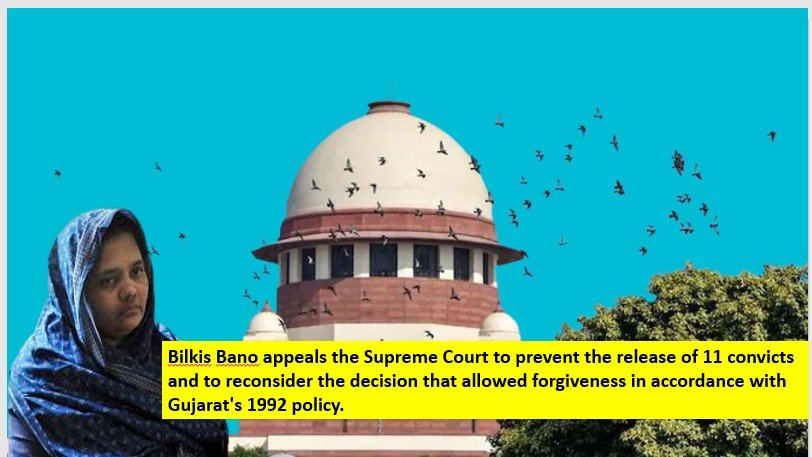
Bilkis Bano appeals the Supreme Court to prevent the release of 11 convicts and to reconsider the decision that allowed forgiveness in accordance with Gujarat’s 1992 policy.
Advocate Shobha Gupta presented the petitions today for listing before a bench headed over by Chief Justice of India DY Chandrachud.
Bilkis Bano, a survivor of a gangrape during the Gujarat riots, has submitted a review petition to the Supreme Court of India challenging the ruling issued on May 13 by the apex court, which stated that remission of convictions should be taken into account in accordance with the law in effect at the time of conviction in the State where the crime was actually committed.
In addition, Bilkis Bano filed a writ case against the Gujarat government’s decision to reduce the sentences of 11 prisoners who had gangraped and killed her family members during the 2002 Godhra riots.
The Chief Justice of India (CJI) stated that he will investigate whether both pleas can be heard simultaneously before the same bench presided over by Justice Ajay Rastogi who had issued the May 13 ruling.
Since the trial took place in Maharashtra, the review petition argues that the state of Maharashtra’s remission policy should be applied in this case rather than Gujarat’s remission policy from 1992.
The power to commute a sentence is in the hands of the appropriate government, which can either be the Central or the State government, but there cannot be concurrent jurisdiction of two State governments, according to a division bench of Justices Ajay Rastogi and Vikram Nath that made this observation in May of this year.
One of the convicts, Radheshyam Bhagwandas Shah @ Lala Vakil, filed a writ petition asking the state of Gujarat to take into account his request for early release under the July 9, 1992 policy that was in effect at the time of his conviction.
After being found guilty of offences under Sections 302, 376(2)€(g), read with Section 149 of the Indian Penal Code, the petitioner was imprisoned for life in a hostile climate .
He had requested early release under Sections 433 and 433A of the Criminal Procedure Code, claiming that he had already served more than 15 years and 4 months in prison.
But his petition, which he had filed with the Gujarat High Court, was eventually dismissed on the grounds that the motion for early release should have been made in Maharashtra rather than Gujarat because the trial had already been completed there.
However, the Supreme Court had ruled that as the crime was admittedly committed in Gujarat, the trial should typically be finished there as well. According to Section 432(7) CrPC, the Gujarat government would be the appropriate government in the normal run of events.
Due to the fact that the crime was committed in Gujarat, the Gujarat government’s policy must be followed in all subsequent processes, including any requests for remission.
“Once the crime was committed in the State of Gujarat, after the trial been concluded and judgment of conviction came to be passed, all further proceedings have to be considered including remission or premature release, as the case may be, in terms of the policy which is applicable in the State of Gujarat where the crime was committed and not the State where the trial stands transferred and concluded for exceptional reasons,” the judgement stated.
30th November, 2022
Written by : Lakshman Singh, 3rd Semester B.B.A LL.B (Hons.), Shri Ramswaroop Memorial University, Lucknow




0 Comments